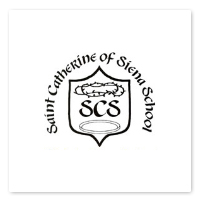DISCIPLINARY RULES, REGULATIONS AND PROCEDURES
Growth in self-discipline is a goal of education at St. Catherine of Siena School. Self- discipline is an aspect of moral guidance and is necessary to provide a classroom environment conducive to learning.
A school and classroom discipline program is designed to help the student choose right rather than wrong, order rather than chaos, virtue rather than vice. Teachers and staff will strive to have a positive approach to discipline within the classroom and schoolyard.
The principal and the pastor are the final recourse in all disciplinary situations and may waive any disciplinary rule for just cause at his/her discretion.
There are two broad policies in regards to school discipline:
ANY BEHAVIOR WHICH DISTRACTS FROM A TEACHER TEACHING OR ANY STUDENT LEARNING IS UNACCEPTABLE.
EVERYONE AT ST. CATHERINE OF SIENA SCHOOL MUST SHOW RESPECT FOR OTHER PEOPLE, PROPERTY, AND IDEAS.
Student Behavior Expectations
As representatives of our school, St. Catherine of Siena students are held to a high standard. Students are expected to behave in a way that reflects our school's mission, vision and philosophy throughout their enrollment, both on and off campus.
All students are expected to:
- Be on time for school with materials ready for class. We are very concerned with the tardiness and will be stressing this aspect of responsibility.
- Come ready to learn and exhibit pride in their work.
- Respect the rights of others and their right to learn.
- Admit mistakes, ask for help, seek adults who can assist with situations, be accountable.
- Remain in appointed play areas.
- Play safe approved games without chasing, tackling, fighting.
- Show acceptable, non-violent behavior in play, language, or gestures.
Behavior and Work Habit grades are an indication of the student's self-discipline. These grades are extremely important.
Positive Reinforcement Strategies
Our teachers will use a variety of positive reinforcement strategies within the classroom. The majority of behavior issues can be addressed within the classroom through redirection of teacher-student conversations. Parents and administration may be involved in the event that more significant behavior issues arise.
The Caught Being Good program is designed to recognize students when they make good choices. Caught Being Good tickets will be given to students for positive behavior or above and beyond actions. Caught being good tickets may be turned into the office for our Monday assembly raffle or after receiving 5 tickets, the student may exchange them for a free dress pass.
Each trimester, teachers select recipients for the Gospel Values Award. Gospel Values is awarded to one or two representatives in a class whom the teacher believes embodied the messages of the Gospel during the trimester. Gospel Value Award recipients are students that have embodied the idea of "living as Jesus taught us."
Consequences of Poor Behavior and/or Choices
Poor behavior in the classroom is defined as any behavior that interferes with his/her own learning, the class’ learning or the teacher's ability to teach.
When a students' behavior interferes with the class' learning, the teacher will apply the following procedure:
Counsel the student during or after school.
Complete a written Conduct Referral to be signed by parents. If not returned, the Administration may contact the parents directly.
Conference with the parent by phone or in person.
Detention will be assigned if the problem persists.
Conduct Referrals are used to communicate poor behavior choices and work habits with parents. The faculty and staff consider them an important tool to maintain communication with parents. Conduct referrals include a brief description of the choice a student has made, as well as any consequences that behavior has incurred and requests for additional comminication, if a teacher deems it necessary. Conduct referrals should be signed the night they are received, with one copy kept at home for your records, and the other returned to the students' Homeroom teacher. Failure to return Conduct Referrals in a timely manner will result in a phone conference with the teacher and/or principal.
A detention notice from the teacher will indicate the reason for the detention and the assigned date and time it is to be served. The slip must be signed by the parent or guardian and returned to the teacher the next day. Persistent behavior problems will jeopardize general conduct grades and jeopardize honor roll qualifications.
Actions that results in Behavior Consequences (ie. suspension, detention) include but are not limited to:
- Excessive talking in class
- Rude, discourteous behavior
- Destruction of school or other property
- Misbehavior in church, on playground, or in school building
- Chewing gum at any time on school property
- Eating at inappropriate places and/or at the wrong times 7. Inappropriate language
- Any other failure to meet classroom or school standards
- Multiple school uniform violations
- After-school conduct inappropriate for students or against school policy
- Misuse of internet or any computer or electronic device
- Cheating on homework or class work by copying, giving other's answers, plagiarism, etc.
- Theft/Stealing
- Forging a signature
- Any other action deemed serious by the principal. vice-principal, and/or pastor.

